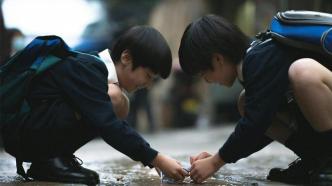
Note: This article contains spoilers
The Douban score of 8.6 made many viewers cry in the previous preview. I watched the movie as soon as it was released. In the middle and late part, I could clearly hear the audience in the back row sobbing. This is indeed a movie that can easily resonate with people who grew up under the exam-oriented education.
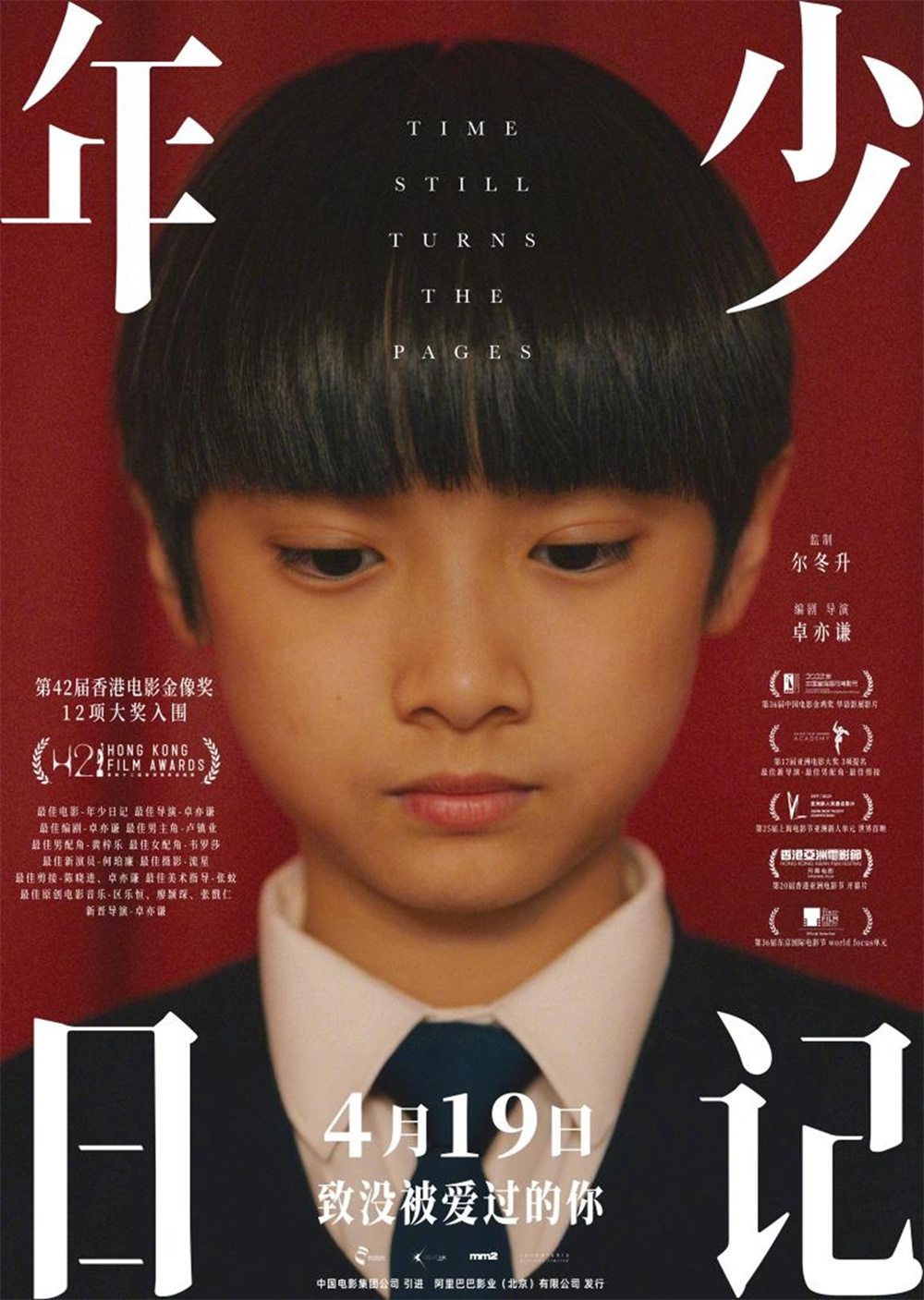
Poster of Teenage Diary
An unsigned suicide note was found in the classroom. Middle school teacher Zheng Sir (played by Lo Chun-yip) tried very hard to find the student who attempted suicide in the class to prevent the tragedy from happening. The words in the suicide note, "I am not an important person. If I leave, soon, everyone will forget me", made Zheng Sir turn over a dusty diary. This is a "suicide note" written by a ten-year-old boy named Zheng Youjie (played by Huang Zile). He was Zheng Sir's brother, whose life stopped at the age of ten.
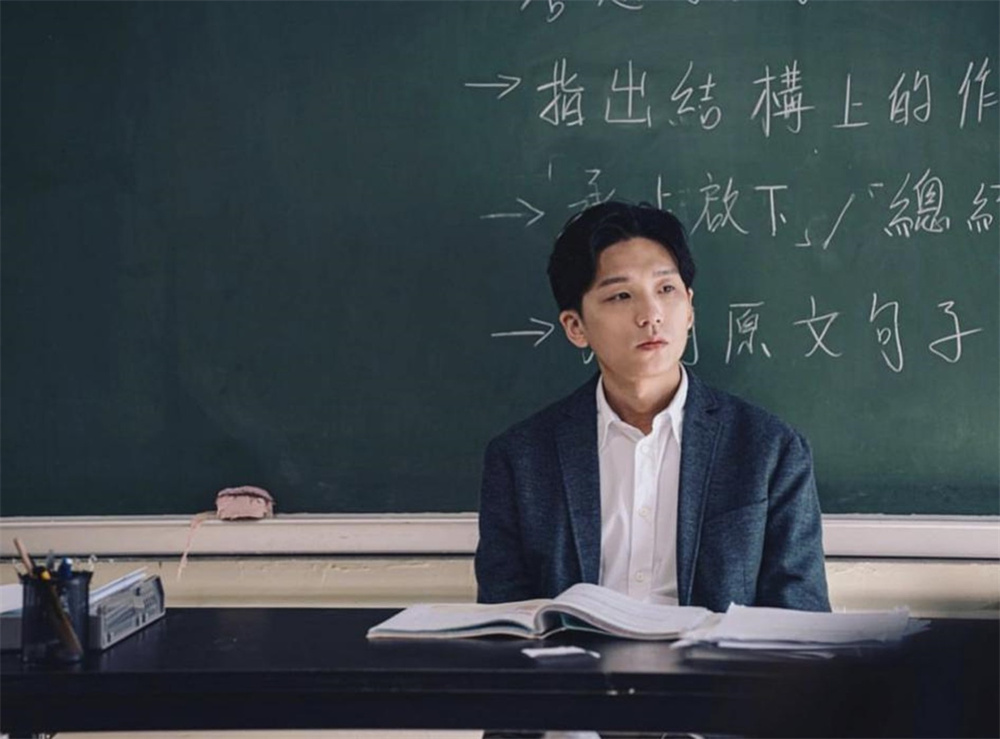
Middle school teacher Zheng Sir (played by Lu Zhenye)
Zheng Youjie's diary can be called a "fallen judgment" - what caused a ten-year-old boy to leave the world? This is a taboo topic, and "Youth Diary" bravely faces it and breaks this "silent culture".

Zheng Youjie (played by Huang Zile)
As Zheng Youjie and his younger brother were growing up, their father Zheng Zixiong (played by Zheng Zhongji) practiced and constantly instilled in them the concept of "meritocracy" but never expressed it out loud.
Meritocracy advocates that social resources should be distributed based on individual talent, effort, and achievement, rather than relying on one’s innate identity, family background, wealth accumulation, or established social status. In terms we are all familiar with, it is “fair competition + admission based on merit + survival of the fittest” and so on.
Indeed, meritocracy has its positive significance. The results-based evaluation system puts individuals in an equal competitive environment, allowing capable people to obtain better positions and social status, promoting social mobility, and thus encouraging people to pursue excellence and success.
Zheng Zixiong himself is a beneficiary of meritocracy. He comes from a commoner family, and through his unremitting efforts, he has achieved class leap, becoming a barrister and becoming an upper-middle class in Hong Kong. As a social celebrity, he said in his speech to students: Opportunities are reserved for those who work hard. Hard work may not necessarily lead to success, but not working hard will definitely lead to failure.
There is nothing wrong with meritocracy, which believes in the value of hard work. However, meritocracy can easily lead those who work hard and succeed to develop an "elitist" mentality.
Since meritocracy evaluates the value of an individual based on his or her achievements, an elitist success tends to believe that his or her success is entirely due to personal effort. Anyone can succeed as long as they work as hard as they do. They ignore the different challenges and difficulties faced by different individuals. What about the losers? It can only be because they are not working hard enough, stupid, dumb, or lazy.
This elitist mentality not only leads to a sense of superiority over their own achievements, like Zheng Zixiong is the "emperor" of his family, he supports the family, he is the best, and he has the final say in everything; and he has no empathy, he does not understand and cannot sympathize with those who have failed to succeed for various reasons, such as his eldest son Zheng Youjie. Zheng Zixiong believes that Zheng Youjie's poor grades and slow piano learning must be due to his lack of effort, improper attitude, and peeking at comics, and he intensifies discrimination, denigration and domestic violence against him.
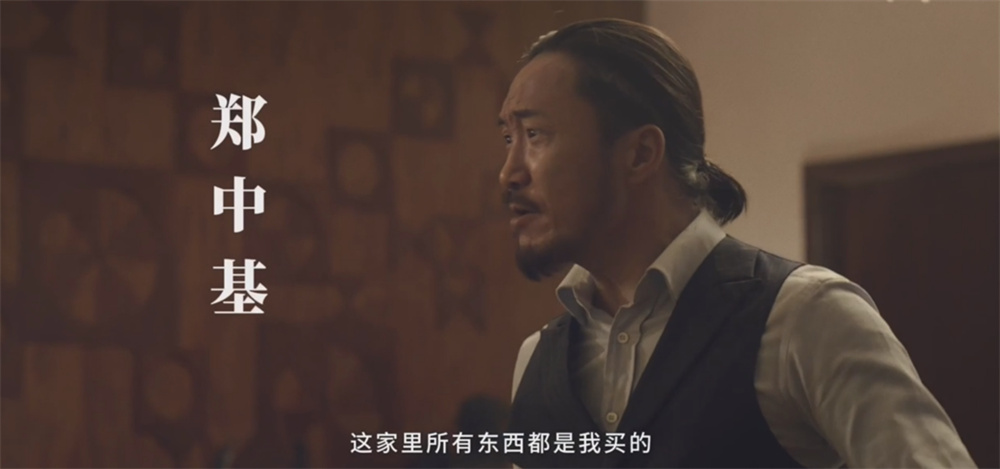
Zheng Zixiong (played by Zheng Zhongji)
In fact, Zheng Youjie is a very obedient child. Under his father's violent discipline, he has been working hard. He longs to be as outstanding as his younger brother Zheng Youjun, and even more "sensible" than other children (such as helping his parents make breakfast to please them). But from his father's elitist perspective, Zheng Youjie, who has poor grades, is just a "trash". He handed his mother water and "showed off" in English "Your cup of water, Mom", but in the car, his father severely reprimanded him: "It's a glass, not a cup, trash!"
It is extremely regrettable that this elitist mentality has also permeated Zheng Youjie's mother (played by Verosa) and his brother. Under the tyranny and indoctrination of Zheng Zixiong, they accepted the logic of "not being successful means not working hard, and not working hard means being rubbish". Deep down, they looked down on Zheng Youjie and never really regarded him as a family member. When Zheng Youjie asked his mother for help because he couldn't sleep and wanted to see a psychiatrist, his mother said that psychiatry is for people with mental illnesses. Are you crazy? The mother tearfully accused and "threatened": If I divorce, it's all because of you!
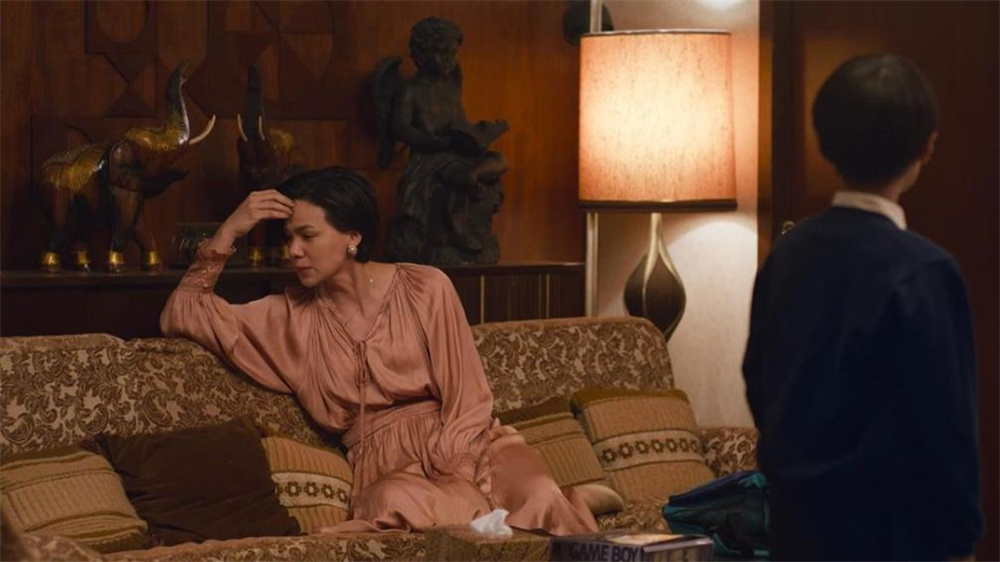
Zheng Youjie's mother (played by Wei Luosha)
The younger brother, who has always worked hard, got good grades, and acted like a good boy, has always been a bystander to everything that Zheng Youjie has encountered. He thinks his brother is "ridiculous" and is glad that he is smart and does not have to become a laughing stock like his brother and get beaten up frequently.

The mother and brother were not moved or surprised by the beating of Zheng Youjie.
Another major harm of meritocracy is that it promotes a narrow, standardized definition of success, where an individual's self-worth is closely tied to their achievements, while ignoring other important dimensions such as personal morality, personal interests, and spiritual pursuits. Individuals have no choice but to succeed in a single dimension, which puts them under tremendous competitive pressure, afraid of failure, afraid of not meeting expectations, and always living in stress, anxiety, and fear.
A ten-year-old boy should have explored the world without worries, enjoyed the fun of childhood, and maintained his beautiful innocence, just like the passionate comic stories that Zheng Youjie believed in. However, every unsatisfactory report card was like a rolling boulder, constantly piling up in his heart. His bright eyes were often obscured by the shadow of worry. He was afraid of his parents' disappointed eyes, the teacher's criticism, and the ridicule of his classmates. At a young age, he had already experienced the so-called "survival pressure" in the adult world, and was under a physical and mental burden beyond his age...

Ten-year-old Zheng Youjie was under tremendous physical and mental pressure, and he also defined himself as "trash".
What is particularly empathetic in the movie is Zheng Youjie's "fear" - fear of poor test scores, fear of repeating a grade, fear of domestic violence from his father, fear of his mother's disappointed eyes. This kind of "fear" accompanies most children who are kidnapped by meritocracy - no matter whether you have good or bad grades, we are all afraid of "failing the test" every time we take an exam. "Failing the test" is still one of my most common nightmares for many years. Every time I wake up, I am filled with great luck - I finally don't have to be a student anymore.
Another harm that meritocracy causes to individuals is that in a meritocracy, individuals can easily attach their self-worth entirely to results. Their self-esteem, self-worth, and self-image almost entirely depend on their achievements. Achievement is not only a display to the outside world, but also a confirmation of self-worth. This deep binding makes individuals extremely sensitive and nervous about results. Every failure and "loss" may extend to a denial of self-worth, and the accumulation of negative emotions from "loss" again and again may eventually lead to the collapse of the individual's tolerance and the collapse of the spiritual world.
Zheng Youjie lost and was deprived again and again, just because of his poor grades. It seemed that he didn’t deserve all the things he liked: his favorite comics, his favorite dolls, the cartoonist who inspired him, his favorite piano teacher... His closest family also reminded him again and again that he didn’t deserve their love. His mother scolded him with tears, his father said coldly, "I won’t beat you anymore, beating you is useless, you can take care of yourself", and his younger brother impatiently refused to chat with him or hug him...

The rare warm moment between Zheng Youjie and his brother became the "evidence" that Zheng Youjie "led his brother astray"
These sentenced Zheng Youjie to "death": "I am not an important person. If I leave, everyone will forget me soon." He really left this world.
Through the fall of a ten-year-old boy, "Diary of a Young Man" analyzes and judges the deep-rooted meritocracy in Hong Kong society and even the entire East Asian society. The Confucian idea of "study hard and become an official" is deeply rooted in people's hearts, and the cultural soil that values education and achievement provides a deep historical foundation for the prevalence of meritocracy; the high-intensity and highly competitive exam-oriented education strengthens the concept of meritocracy, and academic performance becomes an important criterion for measuring personal value; in a fiercely competitive and highly involuted society, people generally believe that only through personal efforts and excellent performance can one stand out in the fierce competition; in the context of the gradual solidification of classes, meritocracy is regarded by many people as the only way to break down class barriers and achieve social leaps, further strengthening the excessive pursuit of personal achievements; social public opinion always closely associates personal success with symbols such as high education, high income, and high status, which increases people's pressure to pursue excellence...
There is nothing wrong with admitting students based on merit, fair competition, and encouraging hard work. However, anyone who advocates meritocracy should not ignore the other side of the issue: there is never absolute equality of opportunity. Factors such as family environment, educational resources, and social networks often affect whether an individual can fully develop his or her talents and efforts, leading to actual inequality of opportunity. Your success may be due to your hard work, but the failure of others may not be due to their lack of effort. Grades and achievements are never the only and sole criterion. A person's all-round personal development, moral character, and public spirit are also invaluable, and even more important.
"Diary of Youth" is unable to fundamentally shake the mountain of meritocracy. It can only appeal to the changes of one individual after another, like a gust of wind driving another gust of wind, like ripples touching ripples, to change one teacher after another, one parent after another, and to help one child after another who is troubled by meritocracy to get rid of it.
"When I was in school, I hoped every day that the teacher would find out that I was unhappy, and talk to me and say hello. But in the end, this teacher did not appear, because I often closed myself off at that time. Looking back, I feel stupid. In fact, as long as you are willing to talk to others, there will definitely be someone who cares about you." Zheng Sir became such a teacher. I believe that "Diary of a Young Man" will touch many parents outside the screen, and also comfort the broken hearts of countless "Zheng Youjies" who have grown up and have never healed - we can all become people like Zheng Sir.
I hope that every injured child can be gently embraced by us.


